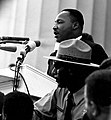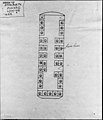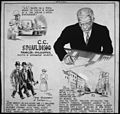Portal:Civil rights movement
The civil rights movement portal The civil rights movement was a social movement and campaign from 1954 to 1968 in the United States to abolish legalized racial segregation, discrimination, and disenfranchisement in the country. The movement had its origins in the Reconstruction era during the late 19th century and had its modern roots in the 1940s. After years of direct actions and grassroots protests, the movement made its largest legislative gains in the 1960s. The social movement's major nonviolent resistance and civil disobedience campaigns eventually secured new protections in federal law for the civil rights of all Americans. The social movement's span of time is called the civil rights era. After the American Civil War and the subsequent abolition of slavery in the 1860s, the Reconstruction Amendments to the United States Constitution granted emancipation and constitutional rights of citizenship to all African Americans, most of whom had recently been enslaved. For a short period of time, African-American men voted and held political office, but as time went on Blacks were increasingly deprived of civil rights, often under the racist Jim Crow laws, and African Americans were subjected to discrimination and sustained violence by White supremacists in the South. Over the following century, various efforts were made by African Americans to secure their legal and civil rights, such as the civil rights movements of 1865–1896 and 1896–1954. The movement was characterized by nonviolent mass protests and civil disobedience following highly publicized events such as the lynching of Emmett Till. These included boycotts such as the Montgomery bus boycott, "sit-ins" in Greensboro and Nashville, a series of protests during the Birmingham campaign, and a march from Selma to Montgomery. At the culmination of a legal strategy pursued by African Americans, in 1954 the Supreme Court struck down the underpinnings of laws that had allowed racial segregation and discrimination to be legal in the United States as unconstitutional. The Warren Court made a series of landmark rulings against racist discrimination, including the separate but equal doctrine, such as Brown v. Board of Education (1954), Heart of Atlanta Motel, Inc. v. United States (1964), and Loving v. Virginia (1967) which banned segregation in public schools and public accommodations, and struck down all state laws banning interracial marriage. The rulings played a crucial role in bringing an end to the segregationist Jim Crow laws prevalent in the Southern states. In the 1960s, moderates in the movement worked with the United States Congress to achieve the passage of several significant pieces of federal legislation that authorized oversight and enforcement of civil rights laws. The Civil Rights Act of 1964 explicitly banned all discrimination based on race, including racial segregation in schools, businesses, and in public accommodations. The Voting Rights Act of 1965 restored and protected voting rights by authorizing federal oversight of registration and elections in areas with historic under-representation of minority voters. The Fair Housing Act of 1968 banned discrimination in the sale or rental of housing. (Full article...) Selected article -The 1964 Monson Motor Lodge protest was part of a series of events during the civil rights movement in the United States which occurred on June 18, 1964, at the Monson Motor Lodge in St. Augustine, Florida. The campaign between June and July 1964 was led by Robert Hayling, Martin Luther King Jr., Ralph Abernathy, Andrew Young, Hosea Williams, C. T. Vivian and Fred Shuttlesworth, among others. St. Augustine was chosen to be the next battleground against racial segregation on account of it being both highly racist yet also relying heavily on the northern tourism dollar. Furthermore, the city was due to celebrate its 400th anniversary the following year, which would heighten the campaign's profile even more. Nightly marches to the slave market were organized; marchers were regularly attacked and beaten. At the same time in the U.S. Senate, the Civil Rights Act of 1964 was being filibustered. On June 10, the filibuster collapsed. The following day, King was arrested in St. Augustine. King had attempted to be served lunch at the Monson Motor Lodge, but the owner, James Brock—who was also the president of the St. Augustine Hotel, Motel, and Restaurant Owners Association—refused to serve him. King was arrested for trespassing and jailed; while imprisoned, he wrote a letter to Israel Dresner, a leading Reform rabbi, urging him to recruit rabbis to come to St. Augustine and take part in the movement. This they did, and, at another confrontation at the Monson, 17 rabbis were arrested on June 18. This was the largest mass arrest of rabbis in American history. At the same time, a group of black and white activists—protesters who had arrived from Albany, Georgia—named J.T. Johnson, Brenda Darten, and Mamie Nell Ford, jumped into the Monson's swimming pool. Brock appeared to pour muriatic acid into the pool to burn the protesters. Photographs of this, and of a policeman jumping into the pool in everything but his shoes to arrest them, made headline news around the world. After the Civil Rights Act had been passed, St. Augustine businesses—particularly in the restaurant and culinary trades—were slow at desegregating. Eventually, the courts forced Brock and his colleagues to integrate their businesses, and soon after he did, the Monson was firebombed by the Ku Klux Klan (KKK), who violently opposed desegregation. The state judge was unsympathetic to his predicament, however, feeling that Brock and his colleagues had brought the violence of the KKK upon themselves; they had taken advantage of it while it was in their favor, and could not stop it now that it was not. (Full article...) General imagesThe following are images from various civil rights movement-related articles on Wikipedia.
Related portalsWikiProjectsSelected biography -Coretta Scott King (née Scott; April 27, 1927 – January 30, 2006) was an American author, activist, and civil rights leader who was the wife of Martin Luther King Jr. from 1953 until his assassination in 1968. As an advocate for African-American equality, she was a leader for the civil rights movement in the 1960s. King was also a singer who often incorporated music into her civil rights work. King met her husband while attending graduate school in Boston. They both became increasingly active in the American civil rights movement. King played a prominent role in the years after her husband's assassination in 1968, when she took on the leadership of the struggle for racial equality herself and became active in the Women's Movement. King founded the King Center, and sought to make his birthday a national holiday. She finally succeeded when Ronald Reagan signed legislation which established Martin Luther King, Jr., Day on November 2, 1983. She later broadened her scope to include both advocacy for LGBTQ rights and opposition to apartheid. King became friends with many politicians before and after Martin's death, including John F. Kennedy, Lyndon B. Johnson, and Robert F. Kennedy. Her telephone conversation with John F. Kennedy during the 1960 presidential election has been credited by historians for mobilizing African-American voters. (Full article...) Selected image - A. Philip Randolph and other civil rights leaders on their way to Congress during the March on Washington, 1963.
Did you know?
TopicsSubcategoriesThings to doAssociated WikimediaThe following Wikimedia Foundation sister projects provide more on this subject:
Discover Wikipedia using portals
|























































